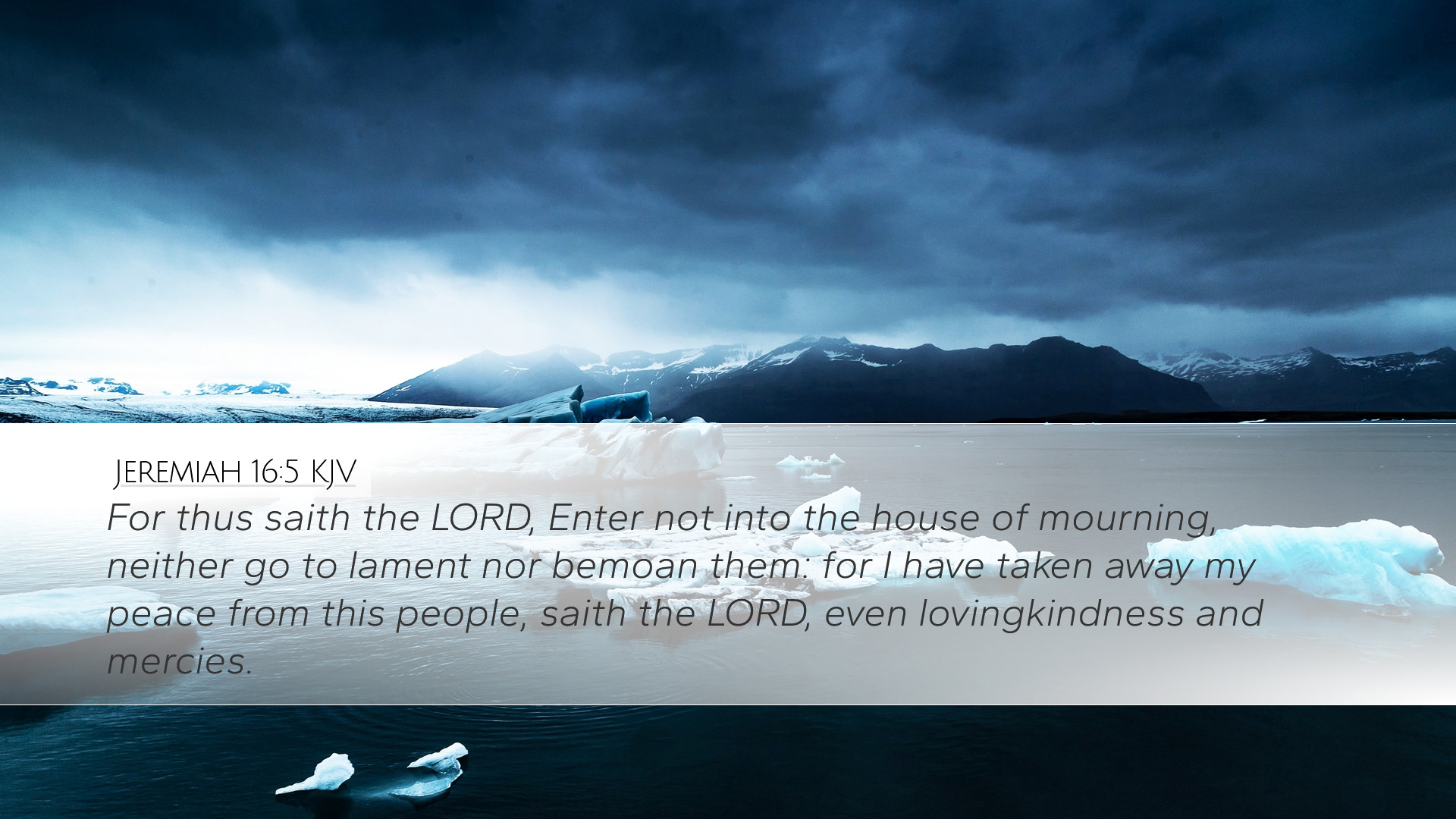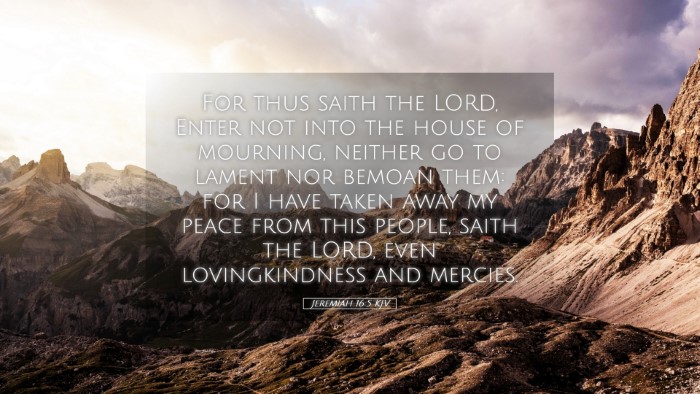Commentary on Jeremiah 16:5
Jeremiah 16:5 states:
"For thus says the Lord: ‘Do not enter the house of mourning, or go to lament or grieve for them; for I have taken away My peace from this people,’ says the Lord, ‘even lovingkindness and mercies.’”
This verse is part of a larger prophetic message concerning the impending judgment and calamity that would fall upon Judah due to their persistent sin and rebellion against God. Here, God communicates not only His judgment but also His withdrawal of peace and mercy, which are foundational to Israel's identity as His people.
Contextual Background
The book of Jeremiah is set in a historical and cultural context of impending doom for Jerusalem and Judah. The prophet Jeremiah was called to minister during the last days of the kingdom of Judah, a time filled with moral decay and spiritual apathy. Scholars like Matthew Henry and Albert Barnes emphasize the gravity of this setting as Jeremiah brings a message calling for repentance, yet faces staunch opposition.
Thematic Insights
- The Judgment of God: The vivid imagery of God taking away peace indicates the seriousness of Judah's transgressions. Adam Clarke notes that this removal of peace is not just physical but deeply emotional and spiritual, reflecting a complete abandonment by God.
- The Role of Mourning: God forbids mourning for the people because their fate is sealed due to their rejection of Him. Barnes observes that true mourning should arise from a godly sorrow for sin, not merely for the hardships that follow judgment.
- The Sovereignty of God: This verse emphasizes God's sovereignty in dealing with His people. He has the authority to remove His presence and blessings, which is a terrifying implication for Israel. Matthew Henry expounds that God’s judgment manifests His holiness and justice, punishing sin while still offering avenues for repentance.
Exegesis of Key Phrases
The prohibition against entering the house of mourning and participating in lamentation provides stark insight into the spiritual state of Judah:
- "Do not enter the house of mourning": This reflects God's command to avoid expressions of grief over those who would face destruction. The absence of God's peace warranted avoiding futile displays of mourning.
- "I have taken away My peace": God's peace is not merely the cessation of conflict but indicates a holistic well-being bestowed upon His people, which is now revoked due to their unfaithfulness.
- "Lovingkindness and mercies": These attributes of God, which reflect His covenant commitment to Israel, are highlighted here as absent. The withdrawal of these qualities signifies profound estrangement from God, suggesting that even in times of distress, God’s character remains unchanging though His active involvement changes.
Theological Reflections
For pastors, students, and theologians, this verse compels deep reflection on the nature of God's holiness and justice:
- Understanding Divine Judgment: The withdrawal of peace catalyzes a broader theological discourse on how sin impacts divine-human relationships. Matthew Henry stresses that such judgments serve as a call to redemptive holiness.
- Mourning and Repentance: The incompatibility of mourning over judgment while neglecting repentance challenges spiritual leaders to encourage genuine sorrow for sin as a precursor to God's restorative work.
- God's Constant Mercy: This passage, while foreboding, does not negate God’s merciful character. The precedent of Israel's return to Him throughout their history serves as a stark reminder of the assurance that God's lovingkindness persists even amidst consequences.
Conclusion
Jeremiah 16:5 serves as a poignant reminder for contemporary audiences of the seriousness of sin, the weight of divine judgment, and the essential qualities of God's nature. The insights drawn from the commentaries of Matthew Henry, Albert Barnes, and Adam Clarke clarify that while God’s judgment is imminent, it is coupled with a glimmer of hope for those who would turn back to Him in true repentance.
For modern readers, it urges an examination of our lives in light of God's standards, reaffirming the truth that while His peace may be withdrawn, His desire for reconciliation remains a testament to His unchanging love.


